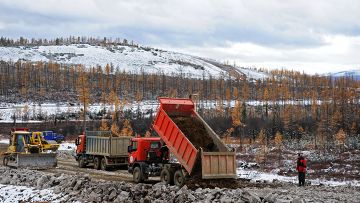
Sustainable development in Russia has grown increasingly important in recent years as the government seeks to modernise the economy and lessen the country’s heavy reliance on extractive industries in the energy and mining sectors. Reforms have been happening through legislation, civil society initiatives and greener business practices, but there is still a long way to go before Russia’s economy becomes truly sustainable.
Given that Russia has such a wealth of natural resources, the focus on maximising their development is only to be expected. The main challenges are to improve the energy efficiency of resource extraction and of the wider economy. Using technology and expertise to create smart cities is a big part of the solution and a major area of potential international cooperation.
There are vast opportunities from modernising energy consumption where efficiency could lead to savings. To push this forward in manufacturing and infrastructure, it is vital to use high-technology and knowledge-intensive solutions wherever possible. This requires advanced methods of management and strategic thinking. Education is the way to build up quality staff in the field so that everyone feels part of the process and understands why it is crucial that Russia develops greener industries.
It is difficult but essential to get leaders from the government, civil society and private enterprises thinking about sustainability. A greener economy in Russia requires a long period of structural and technological transformation – and most importantly the emergence of a “new” responsible citizen.
Smart cities
One way to begin this transformation is to look at how best to leverage the advanced smart cities technology available today in a manner appropriate to the local context. By integrating foreign products into these projects with Russian technology, raising awareness of the various technology solutions, and educating small and medium-sized enterprises on the importance of thinking about energy efficiency and sustainability; Smart City Technologies Group is adapting advanced global technology to regional infrastructure projects in Russia.
During the first project it is imperative to get the division of labour correct and create an effective blueprint for future projects. The first try is always the most difficult, especially from the angle of government and public relations. This complicated process requires local expertise.
One successful project we’ve seen was in developing a long-term partnership with a company in Yakutia, a rugged and frigid region in northeastern Russia. We provided advice on introducing energy-efficient technologies and energy service company (ESCO) for modernisation projects on public buildings, along with legal support and mediation services.
As a result, we saw efficiency improve by more than 50% and a much higher-than-expected return on investment. The lending banks were so impressed that they were willing to initiate similar projects on a bigger scale with the same set of players. Our client built up strong relationships with international technology suppliers and, more importantly, the local and regional government. This led to a significant increase in the number of projects won during various tenders.
Our partner is now becoming a specialist in modernising public and industrial buildings, achieving efficiency gains in the extremely challenging climate of Yakutia, where winter temperatures can fall below -60°Celsius (-76 Fahrenheit). As a next step, we hope to initiate a project in Yakutia with major elements of smart city technologies in the region’s water, transport and energy sectors.
These are experiences that can help Asian countries with their acute energy needs as their populations and economies grow. The focus should be on providing guidance and resources to help cities draft plans for sustainable development and integration of technologies to make that happen. Considering smart cities are the hubs of innovative technologies, their true efficiency will be ensured by smart connections to other cities or states with advanced modes of transport and energy and communication networks.
There will be many policies to negotiate and accommodate. The levels of investment needed to make sustainable development projects viable and effective are so high that they require international cooperation. That is why there is a need to adopt, where possible, clear internationally harmonised rules and technological standards for cross-border cooperation.
As many analysts state, a more balanced share of fossil fuels to alternative clean technologies in the world fuel mix can be expected no sooner than 2050. Before then, we must use the technologies now at our disposal and continue to use fossil fuels – but in more effective ways. In many parts of Asia, for example, compressed natural gas (CNG) or liquefied natural gas (LNG) – a more environmentally friendly fuel than alternatives – is used for transportation. Similarly in Russia, despite its huge oil reserves, we are starting to transform transportation fleets with greener CNG- and LNG-powered vehicles.
We see a huge opportunity for international cooperation. Russia’s vast size, which includes many different landscapes and environments, makes it a playground for economic experimentation. Russia’s long southern border also allows for effective links with Asia, which in the future will allow for more mutually beneficial interactions.
Advanced technologies combined with proven methods of energy diversification can bring sustainable benefits to all. Cooperation should be seen as the way to move to the new green age. Russia is home to the world’s biggest natural gas reserves and enormous mineral deposits, while Asian countries have the desire and abilities to develop innovative technologies. There is much synergy to be found here to create a cleaner, more efficient future.
Nelly Segisova is the Chief Executive Officer of Smart City Technologies Group and a content contributor for the Singapore International Energy Week (SIEW) 2014 website. Themed ‘Building Energy Connections’, SIEW is a leading platform for policymakers, energy players and commentators to discuss energy issues, strategies and solutions. For more information, visit

 September 29, 2014
September 29, 2014  Опубликовано в
Опубликовано в